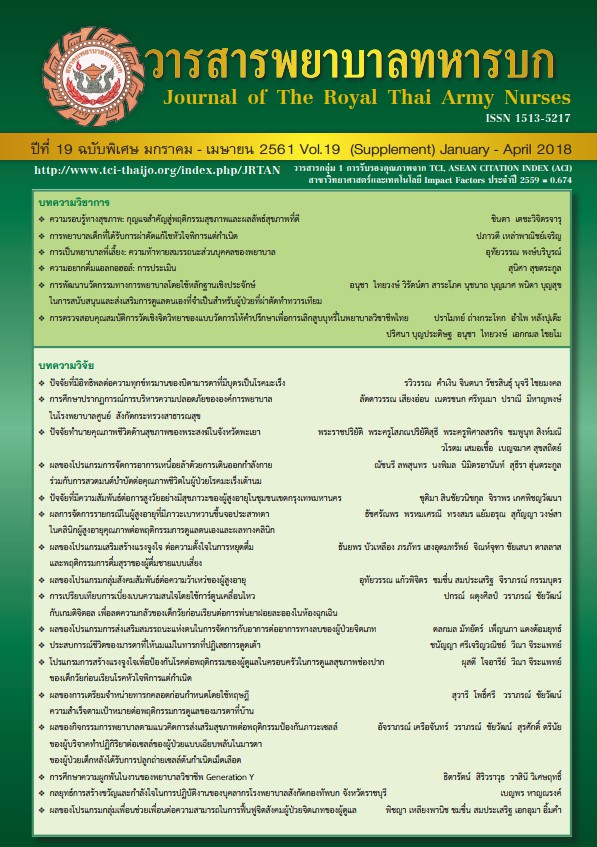The Effect Symptom-Management Self-Efficacy Program On Negative Symptoms Of Schizophrenic Patients
Keywords:
Symptom-management Self-efficacy program, Negative symptoms, Schizophrenic patientsAbstract
The purpose of this quasi-experimental research were to compare the negative symptoms of schizophrenic patients before and after receiving the symptom-management self-efficacy program, and to compare the negative symptoms of schizophrenic patients who received the symptom-management self-efficacy program with those who received regular nursing care. Research samples were 40 schizophrenic patients who met the inclusion criteria from outpatient department, Nakhon Sawan Ratchanakharin Psychiatric Hospital. They were matched by gender and negative symptoms and randomly assigned to experimental and control groups, 20 subjects each. The experimental instrument was the symptom-management self-efficacy program consisted of 4 steps: 1) Emotion arousal 2) Modeling 3) Mastery experience 4) Verbal persuasion. Data were collected using the personal patients’ record form and the positive and negative syndrome scale. All instruments were tested for content validity by 5 professional experts. The content validity index of the positive and negative syndrome scale was .84. Its inter-rater reliability was .72. Data were analyzed using mean, standard deviation and t-test. Major findings were as follow: 1. The mean score of negative symptoms of schizophrenic patients after receiving in the symptommanagement self-efficacy program was significantly lower than that before receiving the program, at the .05 level. 2. The mean score of negative symptoms of schizophrenic patients who received the symptom-management self-efficacy program was significantly lower than those who received regular nursing care, at the .05 level.
Downloads
References
2. Bobes, J., Arango, C., Garcia, M., Rejas, J., CLAMORS Study Collaborative Group. Prevalence of negative symptoms in outpatients with Schizophrenia spectrum disorders treated with antipsychotics in routine clinical practice: findings from the CLAMORS study. J. Clin. Psychiatry. 2010; 71(3): 280-286.
3. Chia et al. The Schizophrenia Cognition Rating Scale: Validation of an interview-based assessment of cognitive functioning in Asian patients with Schizophrenia. Psychiatry Research. 2010; 178: 33-38.
4. Scholosser A. Danielle et al. Modeling the role of negative symptoms in determining social functioning in individuals at clinical hight risk of psychosis. Shizophrenia Research. 2015; 169: 204-208.
5. Deserno, L., Heinz, A., Schlagenhauf F. Computation approaches to schizophrenia: A perspective on negative symptoms. Schizophrenia Research; 2016.
6. Ying L., Wolf, A., & Wang, X. Experience stigma and Self-Stigma in Chinese patients with schizophrenia. General Hospital Psychiatry. 2013; 35: 83-88.
7. Sangeunboonyapong N. andPuapan S. Factors Relating to Loss to Follow-up Among Schizophrenia Patients Enrolled in The Community Hospitals in Chachoengsao Province. Journal of The Royal Thai Army Nurses. 2017; 18(1): 229-236. (in Thai)
8. Lertrakul M. andSukanich P. Psychiatry Ramathibodi 3rd edition Bangkok: Department of Psychiatry Faculty of Medicine. Ramathibodi Hospital Mahidol University; 2012. (in Thai)
9. Cassar Raymond, Eve Applegate, Richard P. Bentall. Poor savouring and low self-efficacy are predictors of anhedonia in patients with schizophrenia spectrum disorders. Psychiatry Research. 2013; 210: 830-834.
10. Bandura, A. Self-efficacy: The exercise of control. New York: Freeman; 1997.
11. Hill Kimberley, andMike Startup. The relationship between internalized stigma, negative symptoms and social functioning in schizophrenia: The mediating role of selfefficacy. Psychiatry Research. 2013; 206: 151-157.
12. Kurtz, M. Matthew , Rachel H. Olfson ,Jennifer Rose. Self-efficacy and function status in schizophrenia: Relationship to insight, cognition and negative symptoms. Schizophrenia Research. 2013; 145: 69-74.
13. Bantengsuk H. Factor predicting of life of schizophrenic patients out-patient department of Phasrimahabodhi psychiatric hospital. The degree of Master of Nursing Science. Facuty of Nursing Chulalongkorn University; 2002. (in Thai)
14. Bunchu S. The effect of perceived self-efficacy program on early warning signs recognition of schizophrenic patients. The degree of Master of Nursing Science. Facuty of Nursing Chulalongkorn University; 2008. (in Thai)
15. Bellack, S. Alan, Samuel M. Turner, Michel Hersen, Raymond F. Luber. An Examination of the Efficacy of Social Skills Training for chronic Schizophrenia Patients. Hospital and Community Psychiatry. 1984; 83(10): 1023-27.
16. Erin, Willis. Patients’ self-efficacy within online health communities: facilitating chronic disease self-management behavior through peer education. Health communication. 2016; 31(3): 299-307.
Downloads
Published
How to Cite
Issue
Section
License
บทความหรือข้อคิดเห็นใดใดที่ปรากฏในวารสารพยาบาลทหารบกเป็นวรรณกรรมของผู้เขียน ซึ่งบรรณาธิการหรือสมาคมพยาบาลทหารบก ไม่จำเป็นต้องเห็นด้วย
บทความที่ได้รับการตีพิมพ์เป็นลิขสิทธิ์ของวารสารพยาบาลทหารบก
The ideas and opinions expressed in the Journal of The Royal Thai Army Nurses are those of the authors and not necessarily those
of the editor or Royal Thai Army Nurses Association.






